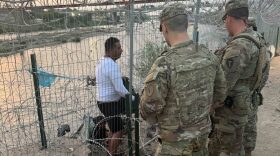Veronica always wanted to give her daughter an education in the United States. This school year, she thought it would finally happen. Her daughter, 17, immigrated from Mexico this summer to live with her in Manchester, New Hampshire.
School in Manchester would be a big change for her daughter. She previously traveled two hours to school from her ranching town, but still, Veronica says she got the highest grades in her class.
But when Veronica tried to register her daughter for school, the process became difficult because Veronica doesn’t speak English. (NHPR isn’t using Veronica’s name or her daughter’s due to concerns about their immigration status.)
Lea esta historia en español aquí.
Veronica says she had a hard time finding a translator and no one in the district offered her the contact information of a bilingual employee who could help.

Veronica’s not the only non-English speaking parent who has struggled to communicate with Manchester schools. The Latino population in New Hampshire has grown by 50 percent, according to the 2020 Census. Like Veronica and her daughter, many Latino families speak only Spanish in their households, and an estimated 1600 students speak Spanish in the district. But bilingual services are far from adequately resourced, and it's been difficult to provide support to help students and families stay involved in their education. Out of 56 languages spoken in the district, there are only two family bilingual liaisons who speak Spanish, one who speaks Swahili and another who speaks Arabic.
The district offers in-person or over-the-phone translation services, but the demand is high and the resources are scarce. But for people like Veronica, who don’t know how to use a computer, it is difficult to even know that these translation services exist. And some parents would prefer bilingual help to come directly from the school. The city currently has a few family bilingual liaisons who work across the school district.
Fernando Martinez, a family bilingual liaison, is one of them. He says he works with over 150 families per week and recognizes the workload is too heavy. After he finishes one case, he already has several more emails and missed calls that came in while he was working.
“I think four people in my job is ideal”, Martinez says.

Martinez’s job is a bridge between families and schools. He translates calls with teachers, connects families with services, and helps complete paperwork in English.
Some of the parents that come to Martinez are frustrated. He says some are afraid to go to schools and ask for information about classes. Others may not even reach out or visit because they say no one is going to understand them in the first place.
Martínez says building trust is the most important part of his job. He’s also Latino and he knows his identity makes it easier to create strong relationships with families.
“The parents trust the same person, the same voice, compared to a translation service by phone,” Martinez says. “They know I will not ask for immigration status, they have the confidence to receive me in their homes."
A family liaison also solves more personal issues. When parents are undocumented or don’t speak English, they can feel left out of their children's education. If they feel excluded, it’s harder to advocate for their kids if there’s a problem at school, which is what happened to Silvia Gomez.
Gomez came to New Hampshire from Puerto Rico after Hurricane Maria in 2017. The following year, her 8-year-old son was bullied at school. Gomez says she wasn’t able to communicate with his teacher about it. Just one teacher at the school spoke a little Spanish, but it wasn’t enough to be able to help Gomez and her son. Eventually, she reached Martinez. With his help, she was able to stop the bullying.

Martinez says if parents know about him at all, they’re familiar with his work because parents pass around his phone number. Word of mouth is, for now, the best way to reach him. Manchester schools do provide information to families about their bilingual liaisons. But a lot of those resources are only published in English.
And Martínez says Manchester schools could do more to help. He says the online portals and forms parents need could be translated into Spanish, which would help his workload a lot.
He knows translation services are essential for immigrant families. But when it’s not available, he also tries to give the families the tools to do it by themselves. But translating without support is hard if the information they're trying to access is only available in English.
The district says it is trying to offer better services. But Nicole Ponti, director of the English as a Second Language program in Manchester, says there isn’t enough funding to hire more people. She says the district is trying to fill the gaps with its phone interpretation services.
“This is something I really want to look into to better serve our parents”, Ponti says.
Ponti said she had heard about parents like Veronica who had trouble communicating with the school system. Ponti says the district is now creating a new informational packet this year with clear information on how to contact the liaisons. They plan to distribute it on parents’ nights, but Ponti does not have a set date of when they will pass the information out.
NHPR gave Veronica Fernando Martinez's number. With his help, Veronica was able to resolve her daughter's registration issue. Now, her daughter attends high school. But she needed a reporter to give her that information. She didn’t find it through official channels. Veronica now has questions regarding how much the school district is willing to help her.
Veronica says she came to the U.S to work, cleaning bathrooms or floors, but above all to work. All she needs is an opportunity and guidance for her daughter from her school district.









